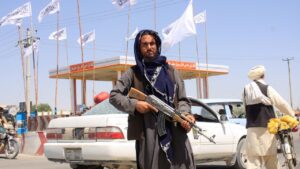
In a compound of the police headquarters in the city of Mazar-i-Sarif in North Afghanistan, a large crowd waited at the door of Wire Mesh. The entrance was guarded by a young Taliban fighters with long hair and beard, who sat in a broken plastic chair. Next to him was a large stack of shoes and flip-flops owned by those who had claimed to meet with the newly appointed Taliban police chief.
It was mid-October 2021, seven weeks since the US withdrawal from Afghanistan, and the Taliban are now responsible for the country. In the big office, Abu Idrees, police chief – who has since been promoted to the Deputy Governor of the Balkh Province, where Mazar is the capital – sitting on the couch, avoiding a large table that stretches almost wide the room, which is a symbol of the previous regime authority. Short and muscular, with a wide shoulder and a big head wrapped in the black turban, he was flanked by his deputies and sub-commanders.
Throughout the day, man – and there is only a man – entering the room, squatting on the floor in front of Abu Idrees. In silent voices, they begged their cases, answering calls or promising their eternal support with the Taliban regime. In theory, anyone can come and demand an audience, something that has never happened under the previous government, when people have to pay bribes and pull the string even to see low-ranking police officers, especially the police chief themselves.
On the surface, it seems that little changed in Mazar since the Taliban won the city in mid-August. Taliban fighters, accumulate behind the army and police pickup trucks, patrolled in the city, while the new white flag of the Taliban integrated car windshield and flew from a motorized pedicab roof, but in general, life is not disturbed. The local community still flocked to the blue historic temple in the heart of the city; They still move at night around the car selling wine, tomatoes and famous white eggplant mazar;
Trucks that are loaded with coal and onions are still heading to the Uzbekistan border, about 50 miles north of the city, while those who bring UN food help drive in the other direction. Even a large mural at the entrance of the city described the deceased Ahmad Shah Massoud, a commander was respected because of his role in fighting the Taliban in the 90s, still standing.
Around the city, women’s schools quietly reopened, opposing leadership in Kabul, who had ordered them to close. But below the surface, changes take place at Mazar.

